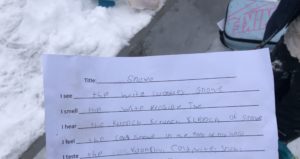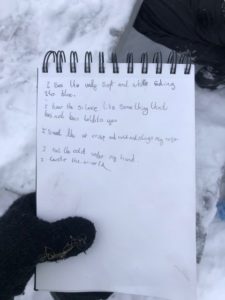Educators understand and apply knowledge of student growth and development.
I planned a literacy lesson for a class with split grade 3-6 involving creating a sensory poem to describe the place we were hiking through. This lesson was planned so that each student could engage in the learning intention (I can use descriptive imagery and metaphor), in unique ways. I had a student who was dyslexic, some that couldn’t write very well, some who loved oral story telling, and some who thrived in writing. To honour where each student was and allow each student to access the learning intention, I encouraged each student to express their poem in whichever way worked best for them. I provided sketchbooks, fill in the blank worksheets, scribing, drawing and oral story telling as options to express learning.
This differentiation of learning honoured where each student was and helped each student grow and develop their skills in using descriptive imagery and metaphor in a way that honoured their strengths. The result of the differentiation of this lesson was that some students who previously had shown very little interest in literacy were speaking beautiful oral poems filled with descriptive imagery and metaphor. At the same time, students who loved writing had the opportunity to continue to develop using descriptive imagery by writing their poem and were challenged to write additional poems or share them orally with the class. Each student demonstrated progression and growth towards the learning intention in their own way.
It is my goal to continue to plan lessons that are inclusive, honour each student’s unique learning journey and challenge students for future growth.


